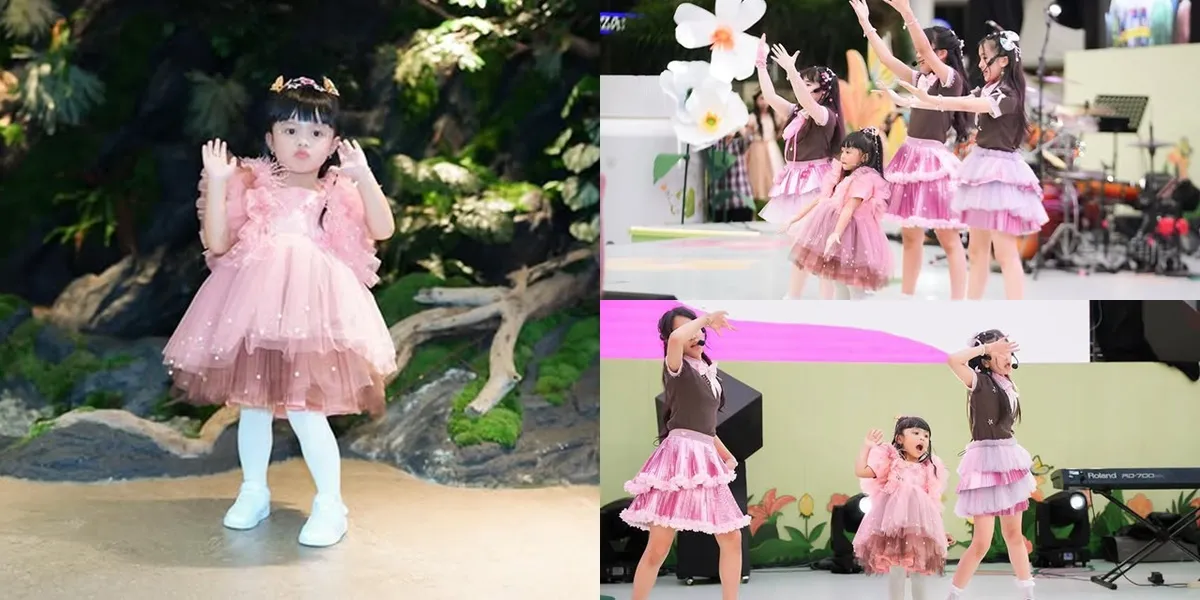Kapanlagi.com - Dreaming of crying until waking up is a fairly common experience but often confusing. Many people who experience it feel anxious and wonder about the meaning behind the dream. This article will thoroughly explore various aspects of the meaning of crying in a dream until waking up, from psychological perspectives to spiritual interpretations.
1. Definition of Crying in a Dream Until Waking Up
Dreaming of crying until waking up can be defined as a sleep experience where someone dreams of crying with such intensity that it causes them to awaken from sleep. Often, individuals who experience this still feel sad or depressed emotions even after waking up, and sometimes tears are still flowing down their cheeks.
This phenomenon is different from regular dreams because it involves strong physical and emotional responses, enough to awaken the dreamer. The intensity of the emotions felt in the dream seems to penetrate the boundary between the dream world and the real world.
From a scientific perspective, dreaming of crying until waking up can occur when someone is in the REM (Rapid Eye Movement) phase of sleep. During this phase, brain activity increases, and the dreams experienced tend to be more vivid and emotional.
2. Causes of Dreaming of Crying Until Waking Up
There are several factors that can trigger the occurrence of dreaming of crying until waking up:
- Repressed stress and anxiety
- Unresolved feelings of sadness or depression
- Unresolved past trauma
- Conflicts or issues in relationships
- Hormonal changes, especially in women
- Side effects from certain medications
- Lack of sleep or sleep pattern disturbances
- Consumption of alcohol or certain substances before sleep
It is important to remember that the causes of this dream can vary for each individual. Some people may experience it due to psychological factors, while others may be more influenced by physiological factors.
3. The Psychological Meaning of Crying Dreams Until Waking Up
From a psychological perspective, dreaming of crying until waking up is often seen as a manifestation of repressed or unresolved emotions. Some common psychological interpretations include:
1. Emotional release: This dream can be a way for the subconscious mind to release negative emotions that have long been buried. Crying in a dream can serve as an emotional catharsis that helps alleviate psychological pressure.
2. Signal of a need for attention: Sometimes, crying dreams can indicate that there is an aspect of life that requires more attention. There may be issues or conflicts that need to be resolved.
3. Healing process: For those who are in the process of recovering from trauma or loss, crying dreams can be part of the psychological healing process.
4. Reflection of anxiety: This dream can also reflect anxiety or fears about the future. Crying in a dream may be an expression of feelings of helplessness or being unprepared to face challenges.
5. Need for support: Often, crying until waking up can indicate that someone needs more emotional support in their life.
4. Spiritual and Cultural Interpretation
In various spiritual and cultural traditions, dreaming of crying until waking up has diverse interpretations:
1. Islam: In some Islamic interpretations, dreaming of crying can be seen as a sign of regret for sins or mistakes. However, if the crying is accompanied by fear of Allah or due to hearing the Quran, it can be considered a sign of goodness.
2. Hindu: Hindu tradition views tears in dreams as a symbol of spiritual cleansing. Crying in a dream can be seen as a process of releasing negative karma.
3. Eastern Culture: Some Eastern cultures see dreaming of crying as a sign of impending happiness or fortune. Tears are considered to cleanse the soul from negative energy.
4. Psychoanalysis: In Freud's psychoanalytic theory, crying in a dream can be viewed as a symbol of repressed desires or unresolved inner conflicts.
5. Javanese Tradition: In Javanese primbon, dreaming of crying until waking up can be interpreted as a sign of news or an emotional event coming soon.
5. Psychological Impact of Crying Dreams Until Waking Up

The Psychological Impact of Crying Dreams Until Waking Up (c) AI Illustration
Experiencing a dream where one cries until waking up can have various psychological impacts, both positive and negative:
Positive Impacts:
- Emotional catharsis - Dreams can serve as a channel for healthy emotional release.
- Increased self-awareness - Analyzing dreams can help a person better understand their emotional state.
- Motivation for introspection - Emotional dreams often encourage people to reflect on their lives.
- Trauma processing - Crying in a dream can be part of the psychological healing process.
Negative Impacts:
- Mood disturbances - Some people may feel depressed or sad throughout the day after a crying dream.
- Anxiety - Intense dreams can trigger anxious feelings about their meaning or consequences.
- Sleep disturbances - Frequent emotional dreams can disrupt sleep quality.
- Confusion - Uncertainty about the meaning of the dream can lead to confusion or restlessness.
It is important to be aware that these psychological impacts vary from one individual to another. Some people may feel relieved after a crying dream, while others may feel disturbed.
6. How to Cope with and Interpret Crying Dreams Until Waking Up

How to Overcome and Interpret Crying Dreams Until Waking Up (c) AI Illustration
If you often experience crying dreams until you wake up and feel disturbed by them, here are some strategies that may help:
- Keep a dream journal - Write down the details of your dreams as soon as you wake up to help analyze them later.
- Self-reflection - Take time to reflect on the emotions and situations in your life that may be reflected in your dreams.
- Practice mindfulness - Meditation and breathing techniques can help manage the stress that may trigger emotional dreams.
- Talk therapy - Consulting with a psychologist or therapist can help uncover the meaning behind your dreams.
- Improve sleep quality - Ensure you are getting enough quality sleep to reduce the intensity of disturbing dreams.
- Express emotions - Find healthy ways to express your feelings in daily life.
- Visualization techniques - Before sleeping, imagine positive scenarios to influence the content of your dreams.
Remember that crying dreams, although sometimes disturbing, are often a natural process of the mind to process emotions. With the right approach, this experience can become a valuable source of insight and personal growth.
7. The Differences in Crying Dreams Across Various Age Groups

The Differences in Crying Dreams Across Various Age Groups (c) AI Illustration
The experience and interpretation of crying dreams can vary depending on a person's stage of life. Here are some common differences found across various age groups:
Children:
- Crying dreams in children often relate to everyday fears or anxieties.
- They may reflect feelings of insecurity or a need for more attention from parents.
- Sometimes they are a response to significant life changes such as moving houses or starting a new school.
Teenagers:
- Crying dreams in teenagers are often associated with academic or social pressures.
- They can reflect struggles with self-identity and acceptance by peers.
- They may reflect conflicts with parents or other authority figures.
Young Adults:
- Crying dreams at this age often relate to career stress or romantic relationships.
- They may indicate worries about the future or achieving life goals.
- Sometimes they reflect feelings of nostalgia or loss of youth.
Middle-Aged Adults:
- At this age, crying dreams may relate to increased family or career responsibilities.
- They may reflect concerns about health or aging.
- Sometimes they reflect life evaluations or midlife crises.
Elderly:
- Crying dreams in the elderly often relate to life reflection and regrets.
- They may reflect feelings of loss or loneliness.
- Sometimes they are a way to process changes in roles within the family or society.
Understanding these differences is important in interpreting crying dreams. The context of age and a person's life stage can provide valuable insights into the sources and meanings behind the tears in their dreams.
8. The Relationship Between Crying Dreams and Mental Health

The Relationship Between Crying Dreams and Mental Health (c) AI Illustration
Dreaming of crying until waking up often has a close connection to a person's mental health condition. Several aspects of this relationship include:
Indicators of Stress and Anxiety:
- The increased frequency of crying dreams can be a sign of high levels of stress or anxiety.
- The content of the dream may reflect specific sources of stress in daily life.
- The intensity of emotions in the dream might be proportional to the level of anxiety experienced while awake.
Symptoms of Depression:
- Recurring crying dreams can be one manifestation of depressive symptoms.
- Themes of sadness or despair in dreams may reflect unresolved feelings of depression.
- The inability to stop crying in a dream could be symbolic of feeling trapped in depression.
The Process of Trauma Healing:
- For trauma survivors, crying dreams can be part of the psychological healing process.
- These dreams may help the brain process and integrate traumatic experiences.
- The intensity of the dreams usually decreases as progress is made in trauma therapy.
Indications of Sleep Disorders:
- Very vivid or disturbing crying dreams can be a sign of sleep disorders such as parasomnia.
- A high frequency of emotional dreams may indicate poor sleep quality, which in turn can affect mental health.
Reflection of Emotional Imbalance:
- Crying dreams can be a way for the subconscious mind to communicate an emotional imbalance that needs to be addressed.
- Variations in the themes or intensity of dreams may reflect fluctuations in mental health over time.
It is important to note that while crying dreams can be indicators of mental health issues, they do not always mean there is a serious disorder. However, if these dreams become very disturbing or occur frequently, consulting with a mental health professional may be a wise step.
9. Relaxation Techniques to Reduce Crying Dreams

Relaxation Techniques to Reduce Crying Dreams (c) AI Illustration
If you often experience distressing dreams of crying, the following relaxation techniques may help reduce their frequency and intensity:
1. Mindfulness Meditation:
- Practice meditation for 10-15 minutes before bedtime.
- Focus your attention on your breath and current body sensations.
- Allow thoughts and emotions to pass without judgment.
2. Deep Breathing Techniques:
- Perform diaphragmatic breathing by inhaling through your nose for a count of 4.
- Hold your breath for a count of 7.
- Exhale slowly through your mouth for a count of 8.
- Repeat this cycle 5-10 times.
3. Progressive Muscle Relaxation (PMR):
- Starting from your toes, tense each muscle group for 5 seconds.
- Relax that muscle for 10 seconds.
- Continue upwards until you reach the muscles in your face.
4. Positive Visualization:
- Imagine a place or situation that makes you feel safe and calm.
- Engage all your senses in this visualization.
- Let the positive feelings from this visualization seep into you.
5. Gentle Yoga:
- Practice calming yoga poses such as Child's Pose or Legs-Up-the-Wall.
- Focus on breathing and gentle stretching.
- Avoid overly challenging poses before bedtime.
6. Journaling:
- Write about your feelings and worries before going to bed.
- Identify and note positive things that happened during the day.
- Make a list of things you are grateful for.
7. Aromatherapy:
- Use calming essential oils like lavender or chamomile.
- Put a few drops on your pillow or use a diffuser in the bedroom.
8.Relaxation Music:
- Listen to soft instrumental music or nature sounds.
- Keep the volume low and let the music play its role in calming the mind.
Try these various techniques and find the combination that works best for you. Consistency is key - practice these techniques regularly for optimal results in reducing the frequency of disruptive crying dreams.
10. Myths and Facts About Crying Dreams

Myths and Facts About Crying Dreams (c) AI Illustration
There are many myths and misconceptions surrounding crying dreams. Let's explore some common myths and the actual facts:
Myth 1: Crying dreams always mean sadness in real life
Fact: While crying dreams can reflect sadness, this is not always the case. Sometimes these dreams can symbolize the release of positive emotions, catharsis, or even a sign of happiness in some cultures.
Myth 2: People who frequently dream of crying must have mental issues
Fact: While crying dreams can be related to stress or anxiety, having this dream regularly does not automatically indicate a mental disorder. It can be a normal way for the brain to process emotions.
Myth 3: Crying dreams are a sign of impending misfortune
Fact: There is no scientific evidence supporting a connection between crying dreams and bad events in the future. Such interpretations are more superstitious than factual.
Myth 4: If you cry in a dream, you are actually crying in your sleep
Fact: While some people may experience light tearing while sleeping, crying in a dream does not always mean you are physically shedding tears.
Myth 5: Crying dreams are only experienced by sensitive people
Fact: Everyone, regardless of their emotional sensitivity, can experience crying dreams. It is a universal phenomenon not limited to a specific personality type.
Myth 6: You should always seek a deep meaning for every crying dream
Fact: While some dreams may have symbolic meanings, not all dreams require deep analysis. Sometimes dreams are just a result of random brain activity during sleep.
Myth 7: Crying dreams are always related to the past
Fact: While dreams can reflect past experiences, they can also relate to current situations or even anticipation of the future.
Myth 8: There is a universal interpretation for all crying dreams
Fact: Dream interpretation is highly personal and contextual. What means something to one person may have a completely different meaning to another, depending on their experiences and background.
Understanding the difference between these myths and facts is important to avoid misunderstandings and unnecessary anxiety surrounding crying dreams. Always remember that dream interpretation should be done with consideration of the individual's personal context and life situation.
11. Frequently Asked Questions (FAQ) About Crying Dreams Until Waking Up
Here are some frequently asked questions about crying dreams until waking up, along with their answers:
1.Does crying in a dream always mean something bad will happen?
No, crying dreams do not always signify bad omens. Often, it is just the brain's way of processing emotions or stress. In some cultures, crying dreams are even considered a sign of good luck or spiritual cleansing.
2.Why do I often dream of crying when my life is fine?
Dreams do not always reflect current reality. Sometimes, crying dreams can be a way for the subconscious mind to release pent-up emotions or process stress that you may not be aware of while awake.
3.Can crying dreams affect my mood throughout the day?
Yes, intense dreams like crying can affect your mood after waking up. However, the effects are usually temporary. If these feelings persist for a long time, there may be other factors to explore.
4. Is it normal if I really cry when waking up from a crying dream?
Yes, this is quite normal. Sometimes, emotions in dreams can be so strong that they carry over into the real world. If this happens often and is disturbing, it might be a good idea to consult a professional.
5. How can I stop recurring crying dreams?
There is no sure way to stop specific dreams, but you can try relaxation techniques before bed, manage daily stress, and maintain a healthy sleep routine. If the dreams are very distressing, therapy might help.
6. Can children also experience crying dreams?
Yes, children can also experience crying dreams. This can be caused by various factors such as anxiety, changes in their lives, or simply as a normal part of their emotional development.
7. Is there a difference between crying dreams in men and women?
Generally, there is no significant difference in the content or frequency of crying dreams between men and women. However, cultural and social factors may influence how someone interprets or responds to these dreams.
8. Can medications affect the frequency of crying dreams?
Yes, some medications, especially those that affect neurotransmitters in the brain, can influence a person's dream patterns, including the frequency of emotional dreams like crying.
9. Can crying dreams be a sign of a sleep disorder?
Although crying dreams themselves are not indicators of a sleep disorder, if these dreams occur very frequently and disturb your sleep quality, it might be a good idea to consult a sleep doctor.
10. What is the best way to interpret crying dreams?
The best way is to reflect on your personal context. Consider what is happening in your life right now, what emotions you are experiencing, and what your subconscious mind might be trying to communicate through that dream.
Remember that dream interpretation is highly subjective and personal. If you feel disturbed by recurring crying dreams, do not hesitate to seek professional help for better understanding and management.
12. Conclusion
Crying dreams that wake you up are a complex and multifaceted experience. Through an in-depth discussion in this article, we have explored various aspects of this phenomenon, from psychological interpretations to spiritual and cultural meanings. Some key points we can conclude:
- Crying dreams are often manifestations of repressed or unresolved emotions in real life.
- The interpretation of these dreams is highly personal and contextual, depending on the individual's life situation and background.
- Although sometimes disturbing, crying dreams can be an important means for emotional release and psychological healing.
- Factors such as stress, trauma, and hormonal changes can affect the frequency and intensity of crying dreams.
- There are various relaxation techniques and stress management strategies that can help reduce disturbing crying dreams.
- It is important to distinguish between myths and facts surrounding crying dreams to avoid misunderstandings and unnecessary anxiety.
Ultimately, crying dreams, although sometimes confusing or disturbing, can be a valuable window into our emotional and psychological state. With a better understanding of the meanings and causes behind these dreams, we can use them as tools for self-introspection and personal growth.
Stay updated with the latest celebrity news only at Kapanlagi.com. If not now, when?
(kpl/nlw)
Disclaimer: This translation from Bahasa Indonesia to English has been generated by Artificial Intelligence.


















